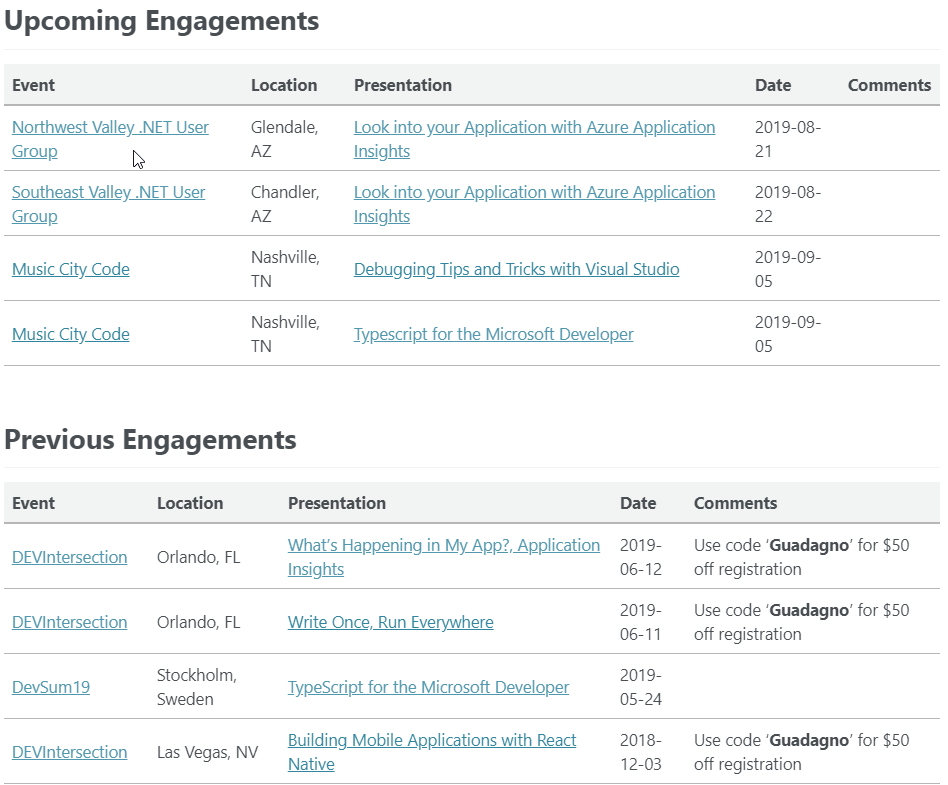Dynamic Blog Posts with Jekyll
Well “dynamic-ish”. The Speaking Engagements page on this site uses data files to generate the list of upcoming and previous speaking engagements. Which generates the content shown here.

Setting up the data files and corresponding markdown files are pretty easy. First, let’s get started with the data file. Jekyll supports loading data from YAML, JSON, CSV, and TSV files located in the _data directory. Note, if you use a CSV or TSV files, there must be a header row in the file. I used a Json file for this examples and named it engagements.json. You can view the full engagements.json on Github. Below is a excerpt of the file for sake a brevity.
Engagements.json
1
2
3
4
5
6
7
8
9
10
11
12
13
14
15
16
17
18
19
20
21
22
23
24
25
26
27
28
[
{
"eventName" : "Southeast Valley .NET User Group",
"eventUrl" : "https://www.meetup.com/sevdnug/events/263472581",
"location" : "Chandler, AZ ",
"presentation" :
{
"name" : "Look into your Application with Azure Application Insights",
"url": "/presentations/look-into-your-application-with-application-insights",
"date" : "2019-08-22",
"comments": ""
},
"isCurrent" : true
},
{
"eventName" : "Northwest Valley .NET User Group",
"eventUrl" : "https://www.meetup.com/NWVDNUG/events/263472395/",
"location" : "Glendale, AZ ",
"presentation" :
{
"name" : "Look into your Application with Azure Application Insights",
"url": "/presentations/look-into-your-application-with-application-insights",
"date" : "2019-08-21",
"comments": ""
},
"isCurrent" : true
}
]
There is nothing special with this json file. The only “requirement”, is that the json file is an array of objects. All of the properties can be in the root object (lines 2-14). However, I chose to break up the object a bit more and add a child property of the engagement called presentation, which has 4 properties: name, url, date, and comments.
Let’s take a look at how we use this data file to make the Speaking Engagements page “dynamic”. While technically it is not dynamic, I only need to edit and commit the file and Jekyll will generate a new page.
Speaking-Engagements.md
Once you create the data file and place it in the _data directory, Jekyll makes it available on the site.data tag in your site markdown. Since our file was named engagements we can access it like so, site.data.engagements. This will be an array of engagement objects.
Since I wanted to manipulate the lists of engagements, separate current engagements from past engagements and do some sorting, I created a variable, sortedCurrentEngagements. This variable will hold a sorted, by presentation.date, list of engagements where the isCurrent property is true. The syntax for the assign is:
1
2
3
{% assign sortedCurrentEngagements = site.data.engagements | sort: 'presentation.date' | where:'isCurrent', 'true' %}
The next step is to iterate/loop through all of the engagements in the sortedCurrentEngagements. This is where the flexibility of Jekyll and the Liquid template engine come to play. We’ll use the Iteration tag within the Liquid templates to iterate through the engagements.
1
2
3
4
5
{% for engagement in sortedCurrentEngagements -%}
|[{{engagement.eventName}}]({{engagement.eventUrl}}){:target="_blank"}|{{engagement.location}}|[{{engagement.presentation.name}}]({{engagement.presentation.url}})|{{engagement.presentation.date}}|{{engagement.presentation.comments }}|
{% endfor %}
The code is a little messy because I have it inside a table. Line 1 and 3, performs the iteration. Line 2 is where we write out all of the data want to. As you can see, to access any of the properties, you need wrap them in double curly braces {{}}
For the previous engagements, we just create another variable, similar to sortedCurrentEngagements but set isCurrent to false.
1
2
3
{% assign sortedPastEngagements = site.data.engagements | sort: 'presentation.date' | reverse | where:'isCurrent', 'false' %}
You can see the entire speaking-engagements.md file on Github.
For more info on this, check out the data files documentation on the Jekyll docs site.
Share on
Bluesky Facebook LinkedIn Reddit XLike what you read?
Please consider sponsoring this blog.


